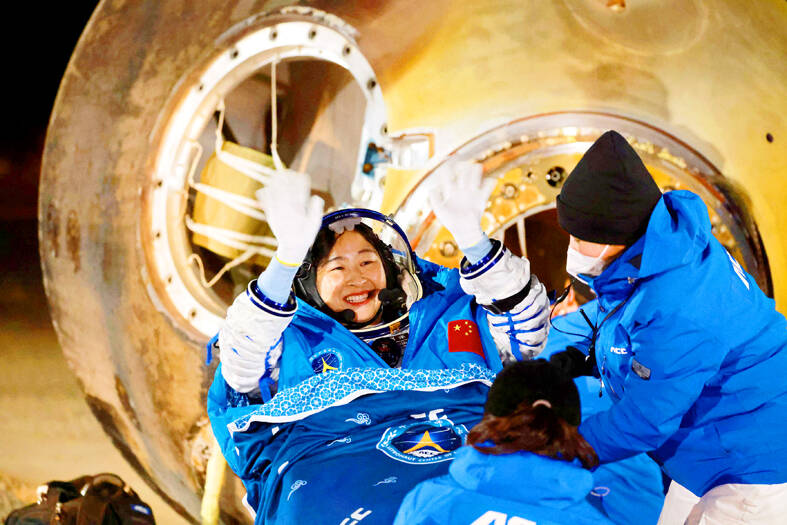The US is closely monitoring Chinese activities that potentially threaten US assets in space as debris rapidly accumulates in low Earth orbit, the head of US Space Force said yesterday.
US Space Command Commander James Dickinson cheered the overwhelming passage in the UN of a resolution that countries not conduct direct ascent anti-satellite (ASAT) tests that create vast fields of space debris, which endanger satellites and space stations.
Of the four countries that have conducted such ASAT tests, the US was the only one that voted in favor, while China and Russia voted no and India abstained.

Photo: Reuters
“We can’t continue to contribute to the debris that we find in the space domain,” Dickinson said in a telephone news conference.
Most of that debris lies in crucial low Earth orbit, which has become “congested, competitive and contested,” he said.
Even tiny shards of metal can pose a danger, and the number of objects is growing rampantly. The US Space Command is tracking more than 48,000 in near Earth orbit, including satellites, telescopes, space stations and pieces of debris of all sizes, up from 25,000 just three years ago, Dickinson said.
China in 2003 became the third government to send an astronaut into orbit on its own after the former Soviet Union and the US. Its program has advanced steadily since.
The Chinese space program drew rare international criticism after it conducted an unannounced test in 2007 in which it used a missile to blow up a defunct Chinese satellite, creating debris that continues to pose a hazard.
Beijing believes that “space is a very important piece to not only their economic or the global economic environment, but also the military environment, so we continue to watch that very closely as they continue to increase capabilities,” Dickinson said.
The secretive Chinese program is run by the Chinese Communist Party’s military wing, the People’s Liberation Army, precluding it from participating in the International Space Station or engaging in most forms of cooperation with NASA.
Proceeding with little outside help, China last month launched the last of three modules for its own space station, which briefly hosted six Chinese astronauts in space during a turnover of the three-person crew. It also has rovers on the moon and Mars, and is planning a crewed lunar mission.
With US-China tensions high over Taiwan, the South China Sea, trade and technology, space is increasingly becoming a potential flash point.
The Pentagon last week released an annual China security report that warned Beijing would likely have 1,500 nuclear warheads by 2035, and that it has provided no clarity on how it plans to use them.
China continues to “build capabilities that, really quite frankly, hold most of our assets at risk in the space domain,” Dickinson said.

MONEY GRAB: People were rushing to collect bills scattered on the ground after the plane transporting money crashed, which an official said hindered rescue efforts A cargo plane carrying money on Friday crashed near Bolivia’s capital, damaging about a dozen vehicles on highway, scattering bills on the ground and leaving at least 15 people dead and others injured, an official said. Bolivian Minister of Defense Marcelo Salinas said the Hercules C-130 plane was transporting newly printed Bolivian currency when it “landed and veered off the runway” at an airport in El Alto, a city adjacent to La Paz, before ending up in a nearby field. Firefighters managed to put out the flames that engulfed the aircraft. Fire chief Pavel Tovar said at least 15 people died, but

LIKE FATHER, LIKE DAUGHTER: By showing Ju-ae’s ability to handle a weapon, the photos ‘suggest she is indeed receiving training as a successor,’ an academic said North Korea on Saturday released a rare image of leader Kim Jong-un’s teenage daughter firing a rifle at a shooting range, adding to speculation that she is being groomed as his successor. Kim’s daughter, Ju-ae, has long been seen as the next in line to rule the secretive, nuclear-armed state, and took part in a string of recent high-profile outings, including last week’s military parade marking the closing stages of North Korea’s key party congress. Pyongyang’s official Korean Central News Agency (KCNA) released a photo of Ju-ae shooting a rifle at an outdoor shooting range, peering through a rifle scope

South Korea would soon no longer be one of the few countries where Google Maps does not work properly, after its security-conscious government reversed a two-decade stance to approve the export of high-precision map data to overseas servers. The approval was made “on the condition that strict security requirements are met,” the South Korean Ministry of Land, Infrastructure and Transport said. Those conditions include blurring military and other sensitive security-related facilities, as well as restricting longitude and latitude coordinates for South Korean territory on products such as Google Maps and Google Earth, it said. The decision is expected to hurt Naver and Kakao

India and Canada yesterday reached a string of agreements, including on critical mineral cooperation and a “landmark” uranium supply deal for nuclear power, the countries’ leaders said in New Delhi. The pacts, which also covered technology and promoting the use of renewable energy, were announced after Indian Prime Minister Narendra Modi and Canadian Prime Minister Mark Carney hailed a fresh start in the relationship between their nations. “Our ties have seen a new energy, mutual trust and positivity,” Modi said. Carney’s visit is a key step forward in ties that effectively collapsed in 2023 after Ottawa accused New Delhi